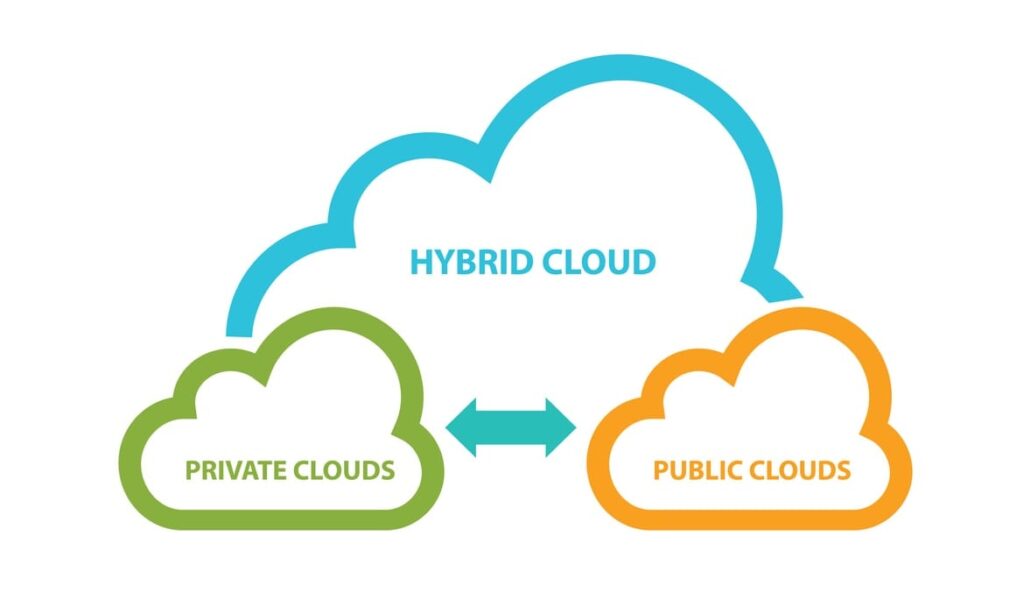
In this Article we”ll dicuss that, Top 19 Benefits of Hybrid Cloud In 2023? As technology continues to evolve, businesses are constantly seeking ways to improve their operations and enhance their ability to meet customer needs. Hybrid cloud computing has emerged as a popular solution that allows companies to take advantage of the benefits of both private and public clouds.
Introduction
Hybrid cloud computing is a computing environment that combines the benefits of private and public cloud computing. In this setup, companies can take advantage of the scalability, cost savings, and flexibility of public cloud computing while maintaining control over their data and systems.

1. Cost-Effective Solution
One of the biggest advantages of hybrid cloud computing is its cost-effectiveness. By using a hybrid cloud solution, businesses can take advantage of the scalability and cost savings of public cloud computing while still retaining control over their data and systems.
2. Scalability
Another benefit of hybrid cloud computing is its scalability. As businesses grow, their computing needs change, and a hybrid cloud solution can accommodate those changes by providing access to additional computing resources.
3. Flexibility
Hybrid cloud computing is also highly flexible. Businesses can choose to run certain applications or workloads in the public cloud while keeping others in the private cloud, depending on their specific needs.
4. Increased Security
Hybrid cloud computing offers increased security over traditional computing solutions. By keeping sensitive data in the private cloud, businesses can protect it from potential security breaches while still taking advantage of the scalability and cost savings of public cloud computing.
5. Data Control
Hybrid cloud computing also provides businesses with greater control over their data. By keeping critical data and applications in the private cloud, businesses can ensure that they are always accessible and secure.
6. Disaster Recovery
Hybrid cloud computing can also help businesses with disaster recovery. By keeping critical data and applications in the private cloud, businesses can quickly recover from disasters or other unexpected events.

7. Improved Collaboration
Hybrid cloud computing can also improve collaboration within businesses. By providing access to computing resources from anywhere, businesses can enable employees to collaborate more effectively and efficiently.
8. Global Accessibility
Another advantage of hybrid cloud computing is its global accessibility. By using a hybrid cloud solution, businesses can ensure that their computing resources are always available to employees and customers around the world.
9. Enhanced Performance
Hybrid cloud computing can also enhance performance. By using the public cloud for non-critical applications and workloads, businesses can free up computing resources in the private cloud for critical applications and workloads, resulting in improved performance overall.

10. Agility
Hybrid cloud computing also provides businesses with greater agility. By using a hybrid cloud solution, businesses can quickly adapt to changes in computing needs and respond to
11. Green Computing
Hybrid cloud computing can also support green computing initiatives. By using public cloud resources only when necessary, businesses can reduce their overall energy consumption and environmental impact.
12. Reduced Downtime
Hybrid cloud computing can help reduce downtime by providing businesses with redundant computing resources. This means that if one system fails, the other systems can continue to operate, minimizing downtime and ensuring continuity of operations.
13. Compliance and Regulation
Hybrid cloud computing can also help businesses comply with regulatory requirements. By keeping sensitive data in the private cloud, businesses can ensure that they are meeting regulatory requirements while still taking advantage of the benefits of public cloud computing.
14. Faster Time to Market
Hybrid cloud computing can help businesses bring products and services to market more quickly by providing access to computing resources on demand. This means that businesses can rapidly develop and deploy new applications and services, improving their competitiveness and agility.
15. Streamlined Operations

Hybrid cloud computing can help businesses streamline their operations by providing a single point of management for both private and public cloud resources. This simplifies IT management and reduces operational overhead.
16. Integration with Legacy Systems
Hybrid cloud computing can also help businesses integrate legacy systems with modern cloud-based applications and services. This allows businesses to take advantage of the benefits of cloud computing without abandoning their existing systems and applications.

17. Reduced Complexity
Hybrid cloud computing can help businesses reduce complexity by providing a unified computing environment. By using a hybrid cloud solution, businesses can simplify their IT infrastructure and reduce the number of systems they need to manage.
18. Predictable Costs
Hybrid cloud computing can help businesses control their costs by providing predictable pricing models. By using a hybrid cloud solution, businesses can more accurately forecast their computing costs and avoid unexpected expenses.
Read More: How Can Search Engine Yandex Avoid a Massive Leak
19. Customizable Solutions
Finally, hybrid cloud computing provides businesses with customizable solutions that can be tailored to their specific needs. By using a hybrid cloud solution, businesses can select the resources and services that are most appropriate for their operations, improving efficiency and reducing costs.
Conclusion
Hybrid cloud computing is an increasingly popular solution for businesses seeking to take advantage of the benefits of both private and public cloud computing. By using a hybrid cloud solution, businesses can improve their operations, enhance their competitiveness, and reduce costs. From increased security and data control to improved collaboration and agility, hybrid cloud computing offers a wide range of benefits that businesses can take advantage of in 2023 and beyond.
FAQs
What is hybrid cloud computing?
Hybrid cloud computing is a computing environment that combines the benefits of private and public cloud computing.
What are the benefits of hybrid cloud?
The benefits of hybrid cloud computing include cost savings, scalability, flexibility, increased security, data control, disaster recovery, improved collaboration, global accessibility, enhanced performance, agility, green computing, reduced downtime, compliance and regulation, faster time to market, streamlined operations, integration with legacy systems, reduced complexity, predictable costs, and customizable solutions.
How does hybrid cloud computing improve security?
Hybrid cloud computing improves security by keeping sensitive data in the private cloud while still taking advantage of the scalability and cost savings of public cloud computing.
Can I customize my hybrid cloud solution?
Yes, hybrid cloud solutions can be customized to meet the specific needs of businesses.
How can hybrid cloud computing help with disaster recovery?
Hybrid cloud computing can help with disaster recovery by providing redundant computing resources that can ensure continuity of operations in the event of a system failure or other unexpected event.











